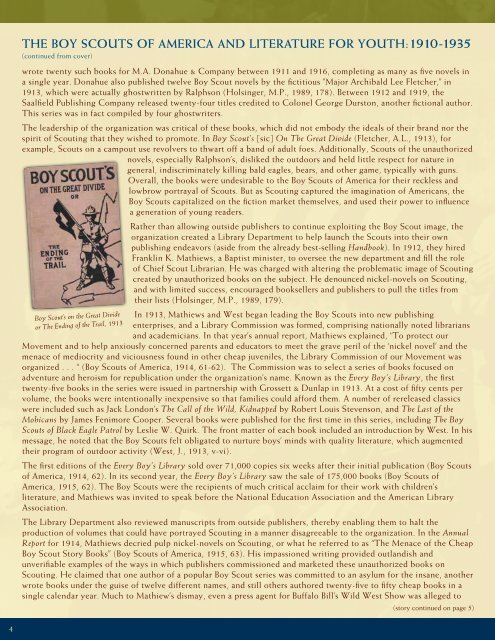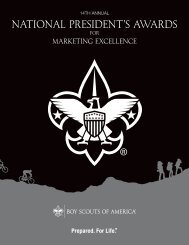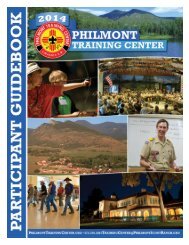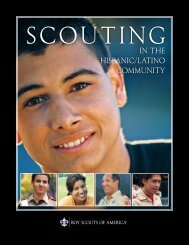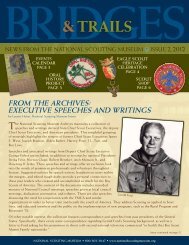The Boy ScouTS of AmericA And LiTerATure for youTh: 1910-1935
The Boy ScouTS of AmericA And LiTerATure for youTh: 1910-1935
The Boy ScouTS of AmericA And LiTerATure for youTh: 1910-1935
- No tags were found...
You also want an ePaper? Increase the reach of your titles
YUMPU automatically turns print PDFs into web optimized ePapers that Google loves.
<strong>The</strong> <strong>Boy</strong> Scouts <strong>of</strong> America and Literature <strong>for</strong> Youth: <strong>1910</strong>-<strong>1935</strong>(continued from cover)wrote twenty such books <strong>for</strong> M.A. Donahue & Company between 1911 and 1916, completing as many as five novels ina single year. Donahue also published twelve <strong>Boy</strong> Scout novels by the fictitious ”Major Archibald Lee Fletcher,” in1913, which were actually ghostwritten by Ralphson (Holsinger, M.P., 1989, 178). Between 1912 and 1919, theSaalfield Publishing Company released twenty-four titles credited to Colonel George Durston, another fictional author.This series was in fact compiled by four ghostwriters.<strong>The</strong> leadership <strong>of</strong> the organization was critical <strong>of</strong> these books, which did not embody the ideals <strong>of</strong> their brand nor thespirit <strong>of</strong> Scouting that they wished to promote. In <strong>Boy</strong> Scout’s [sic] On <strong>The</strong> Great Divide (Fletcher, A.L., 1913), <strong>for</strong>example, Scouts on a campout use revolvers to thwart <strong>of</strong>f a band <strong>of</strong> adult foes. Additionally, Scouts <strong>of</strong> the unauthorizednovels, especially Ralphson’s, disliked the outdoors and held little respect <strong>for</strong> nature ingeneral, indiscriminately killing bald eagles, bears, and other game, typically with guns.Overall, the books were undesirable to the <strong>Boy</strong> Scouts <strong>of</strong> America <strong>for</strong> their reckless andlowbrow portrayal <strong>of</strong> Scouts. But as Scouting captured the imagination <strong>of</strong> Americans, the<strong>Boy</strong> Scouts capitalized on the fiction market themselves, and used their power to influencea generation <strong>of</strong> young readers.Rather than allowing outside publishers to continue exploiting the <strong>Boy</strong> Scout image, theorganization created a Library Department to help launch the Scouts into their ownpublishing endeavors (aside from the already best-selling Handbook). In 1912, they hiredFranklin K. Mathiews, a Baptist minister, to oversee the new department and fill the role<strong>of</strong> Chief Scout Librarian. He was charged with altering the problematic image <strong>of</strong> Scoutingcreated by unauthorized books on the subject. He denounced nickel-novels on Scouting,and with limited success, encouraged booksellers and publishers to pull the titles fromtheir lists (Holsinger, M.P., 1989, 179).<strong>Boy</strong> Scout’s on the Great Divideor <strong>The</strong> Ending <strong>of</strong> the Trail, 1913In 1913, Mathiews and West began leading the <strong>Boy</strong> Scouts into new publishingenterprises, and a Library Commission was <strong>for</strong>med, comprising nationally noted librariansand academicians. In that year’s annual report, Mathiews explained, “To protect ourMovement and to help anxiously concerned parents and educators to meet the grave peril <strong>of</strong> the ‘nickel novel’ and themenace <strong>of</strong> mediocrity and viciousness found in other cheap juveniles, the Library Commission <strong>of</strong> our Movement wasorganized . . . “ (<strong>Boy</strong> Scouts <strong>of</strong> America, 1914, 61-62). <strong>The</strong> Commission was to select a series <strong>of</strong> books focused onadventure and heroism <strong>for</strong> republication under the organization’s name. Known as the Every <strong>Boy</strong>’s Library, the firsttwenty-five books in the series were issued in partnership with Grossett & Dunlap in 1913. At a cost <strong>of</strong> fifty cents pervolume, the books were intentionally inexpensive so that families could af<strong>for</strong>d them. A number <strong>of</strong> rereleased classicswere included such as Jack London’s <strong>The</strong> Call <strong>of</strong> the Wild, Kidnapped by Robert Louis Stevenson, and <strong>The</strong> Last <strong>of</strong> theMohicans by James Fenimore Cooper. Several books were published <strong>for</strong> the first time in this series, including <strong>The</strong> <strong>Boy</strong>Scouts <strong>of</strong> Black Eagle Patrol by Leslie W. Quirk. <strong>The</strong> front matter <strong>of</strong> each book included an introduction by West. In hismessage, he noted that the <strong>Boy</strong> Scouts felt obligated to nurture boys’ minds with quality literature, which augmentedtheir program <strong>of</strong> outdoor activity (West, J., 1913, v-vi).<strong>The</strong> first editions <strong>of</strong> the Every <strong>Boy</strong>’s Library sold over 71,000 copies six weeks after their initial publication (<strong>Boy</strong> Scouts<strong>of</strong> America, 1914, 62). In its second year, the Every <strong>Boy</strong>’s Library saw the sale <strong>of</strong> 175,000 books (<strong>Boy</strong> Scouts <strong>of</strong>America, 1915, 62). <strong>The</strong> <strong>Boy</strong> Scouts were the recipients <strong>of</strong> much critical acclaim <strong>for</strong> their work with children’sliterature, and Mathiews was invited to speak be<strong>for</strong>e the National Education Association and the American LibraryAssociation.<strong>The</strong> Library Department also reviewed manuscripts from outside publishers, thereby enabling them to halt theproduction <strong>of</strong> volumes that could have portrayed Scouting in a manner disagreeable to the organization. In the AnnualReport <strong>for</strong> 1914, Mathiews decried pulp nickel-novels on Scouting, or what he referred to as “<strong>The</strong> Menace <strong>of</strong> the Cheap<strong>Boy</strong> Scout Story Books” (<strong>Boy</strong> Scouts <strong>of</strong> America, 1915, 63). His impassioned writing provided outlandish andunverifiable examples <strong>of</strong> the ways in which publishers commissioned and marketed these unauthorized books onScouting. He claimed that one author <strong>of</strong> a popular <strong>Boy</strong> Scout series was committed to an asylum <strong>for</strong> the insane, anotherwrote books under the guise <strong>of</strong> twelve different names, and still others authored twenty-five to fifty cheap books in asingle calendar year. Much to Mathiew’s dismay, even a press agent <strong>for</strong> Buffalo Bill’s Wild West Show was alleged to(story continued on page 5)4


